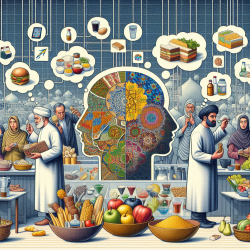Introduction
In the realm of speech-language pathology and beyond, understanding the intricate factors that influence food choices can significantly impact our approaches to therapy and intervention. The study titled Psycho-Socio-Cultural Determinants of Food Choice: A Qualitative Study on Adults in Social and Cultural Context of Iran offers a comprehensive look into the factors that shape dietary decisions among adults in Tehran, Iran. This research provides valuable insights that can be leveraged to enhance therapeutic outcomes and promote healthier eating behaviors.
Understanding the Determinants
The study identifies five main themes influencing food choices: cultural context and patterns, social structure and norms, information resources and media, family structure, and nutrition transition. These determinants are crucial in understanding how individuals make dietary decisions, which are often rooted in their psycho-socio-cultural backgrounds.
- Cultural Context and Patterns: Cultural beliefs and practices significantly influence food choices. For instance, traditional foods and cooking methods are often preferred, yet modern lifestyles and lack of cooking skills can lead to a shift towards convenience foods.
- Social Structure and Norms: Social interactions, job constraints, and accessibility to resources play a critical role in shaping dietary habits. Time constraints and social gatherings can lead to the consumption of less healthy food options.
- Information Resources and Media: Media and nutritional education impact food choices by shaping perceptions of what is considered healthy and desirable.
- Family Structure: The socio-economic position of a household and the roles of family members, particularly women, influence the types of foods consumed.
- Nutrition Transition: The shift from traditional to modern diets, characterized by increased consumption of fast foods, reflects broader socio-economic changes.
Implications for Practitioners
For practitioners, understanding these determinants can guide the development of culturally and socially appropriate interventions. By acknowledging the cultural and social contexts of their clients, practitioners can tailor their strategies to promote healthier eating habits effectively.
Practitioners are encouraged to consider the following approaches:
- Incorporate cultural preferences and traditional foods into dietary recommendations.
- Address social and familial influences by engaging family members in the therapeutic process.
- Utilize media and educational resources to enhance nutritional knowledge and awareness.
- Adapt interventions to accommodate time constraints and lifestyle factors that affect food choices.
Encouraging Further Research
While this study provides a foundational understanding of food choice determinants in Tehran, further research is needed to explore these factors in different cultural contexts and populations. Practitioners are encouraged to contribute to this growing body of knowledge by conducting studies that examine the interplay of cultural, social, and psychological factors in food choices across diverse settings.
Conclusion
The insights gained from this study underscore the importance of considering psycho-socio-cultural determinants in dietary interventions. By leveraging these insights, practitioners can create more effective strategies to improve dietary behaviors and promote healthier communities.
To read the original research paper, please follow this link: Psycho-Socio-Cultural Determinants of Food Choice: A Qualitative Study on Adults in Social and Cultural Context of Iran.










